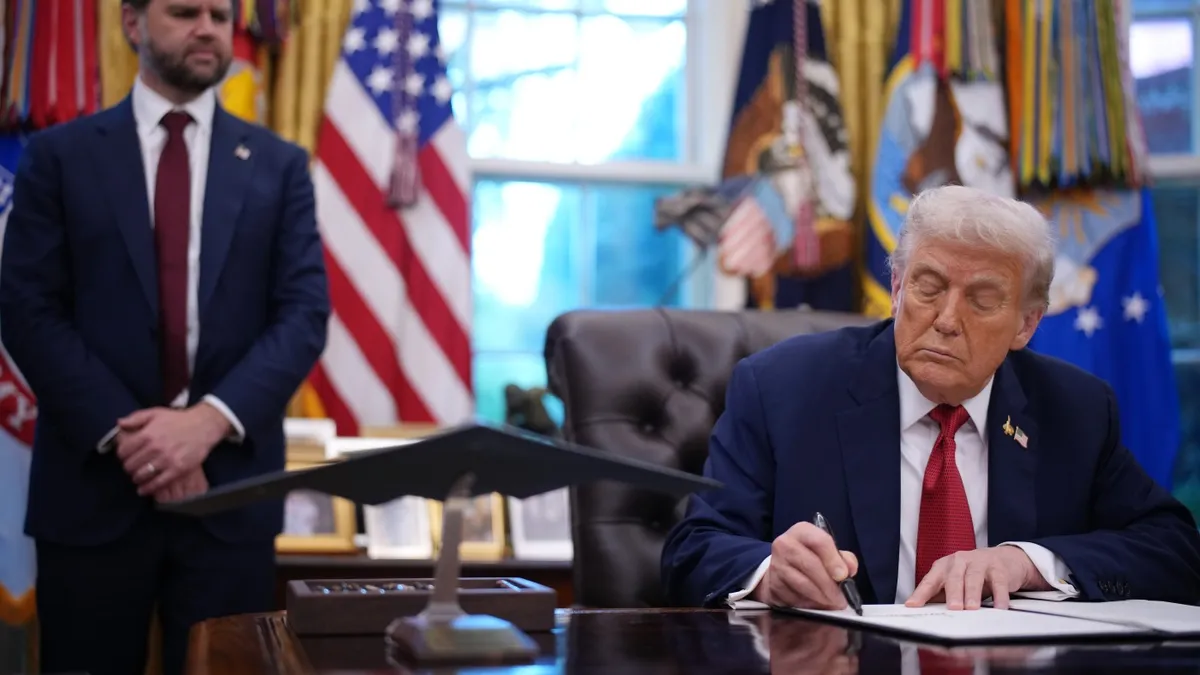
The Trump administration has taken a significant step in its ongoing negotiations regarding the ownership of TikTok's U.S. operations. Recently, a coalition of U.S. investors, including notable figures such as tech mogul Larry Ellison, the Murdoch family, and venture capital firm Andreessen Horowitz, was approached with a unique proposal. According to a source familiar with the discussions, the administration requested that the investor group make a payment to the federal government in the low billions. The response from the investors was overwhelmingly affirmative, as none of the members expressed hesitation about the payment, viewing it as a kind of finders' fee.
This request marks a notable shift in President Trump's business agenda, resembling a strategy where the federal government operates akin to a high-end consulting firm, charging lucrative fees for facilitating deals. The administration's recent actions have included various financial demands, such as seeking a share of Nvidia and AMD's chip sales to China and negotiating an equity stake in Lithium Americas as part of a government loan deal. This trend reflects a broader campaign by the White House to extract financial concessions from businesses, a situation described by finance professor Luigi Zingales from the University of Chicago as a tax imposed on every major business transaction.
Experts are expressing concerns that this approach may hinder innovation and value creation within American businesses, shifting the focus toward rent-seeking behavior instead. Zingales notes that the current environment compels businesses to cater to the administration, rather than pursuing genuine innovation and growth. The White House did not respond to requests for comment regarding these developments.
In public statements, Trump has defended his administration's interventions in private enterprise. For instance, he publicly praised Intel for selling a 10% stake to the U.S. government, claiming it was a beneficial deal for both America and the company, which he stated is now valued at approximately $11 billion.
The Trump administration's influence extends into the media sector, where many companies have capitulated to pressure from the president. Notably, parent companies of major news networks like ABC and CBS settled lawsuits related to allegations of mistreatment by Trump, resulting in a combined payment of $16 million. These funds were directed toward Trump’s presidential library and legal fees. Following these settlements, regulatory approvals for media mergers, such as CBS's acquisition by Skydance Media, have raised eyebrows, particularly due to the connections between Trump and key players in the media landscape.
Before the election, major media owners adjusted their editorial policies to present less criticism of Trump. This shift illustrates the influence of business interests on journalistic integrity, as owners like Jeff Bezos of The Washington Post and Dr. Patrick Soon-Shiong of the Los Angeles Times have significant stakes dependent on federal decisions.
The involvement of the Murdoch family in the TikTok deal has sparked discussions about crony capitalism. As controlling owners of influential media outlets, their participation raises questions about the motivations behind the deal. Observers note that the administration has fostered an environment where loyalty to Trump translates into business opportunities, further entrenching a system of favoritism.
Critics argue that this behavior undermines the principles of a free market and can be categorized as a form of extortion. Professor Dael Norwood from the University of Delaware highlighted that all Americans suffer from the consequences of such schemes, which inflate costs and erode trust in fair dealings. Concerns have been echoed by business leaders, with many fearing retaliation for speaking out against the administration's tactics.
In a recent gathering of over 100 top CEOs organized by Jeffrey Sonnenfeld of the Yale School of Management, there was a strong consensus that Trump's business interventions threaten the foundation of American capitalism. Sonnenfeld described the situation as a violation of core capitalist principles and urged corporate executives to speak out against these practices.
The discussions surrounding the potential acquisition of TikTok's U.S. operations have been ongoing for five years, initially sparked by the Trump administration's concerns over the app's Chinese ownership. Oracle, a software and cloud computing company closely linked to Trump through its co-founder Larry Ellison, is anticipated to play a pivotal role in the bid. Sources indicate that Oracle would oversee the management of TikTok's American user data, while Beijing-based ByteDance would retain a minority stake in the venture.
One unexpected element in the negotiations was the multibillion-dollar fee request, which caught investors off guard. Despite their surprise, many view this as a necessary cost of doing business in the current political climate, reflecting the increasing intertwining of government interests and corporate strategies.